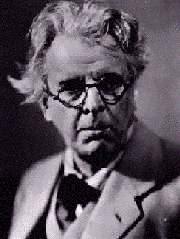June 13: William Butler Yeats
William Butler Yeats (1865)
It was on this date, June 13, 1865, that Irish poet and playwright, William Butler Yeats, was born in Dublin into an Irish Protestant family. His father was a barrister-turned-painter, so Yeats studied painting until the success of his first volume of poems, Mosada, A Dramatic Poem, in 1886, followed by The Wanderings of Oisín in 1889. He spent much time in London, where he became close with such Rationalists as poet William Ernest Henley (1849-1903), artist William Morris (1834-1896), and poet and playwright Arthur Symons (1865-1945).
Yeats's poetry is influenced by the English Romantic tradition and by his fascination with the occult, following his study of William Blake and Emanuel Swedenborg. His Romantic yearning often took the form of his characterization of the beautiful Madame Gonne McBride, the unrequited love of his life, who is transformed by Yeats into the Rose, Helen of Troy, the Ledaean Body, Cathleen ni Houlihan, Pallas Athene and Deirdre. His occult preoccupations were encouraged by his wife, Georgie Hyde Lees, a supposed spirit medium, whom Yeats married in 1917 when she was half his age.
In addition to his poetry, Yeats wrote twenty-six plays. When he returned to Ireland from England, Yeats helped to found the Irish Literary Theater in 1899 (later the Abbey Theater) and led the Irish literary movement. The Irish State rewarded Yeats with a Senate seat, 1922-1928; the world recognized his talents with the Nobel prize for literature in 1923.
Yeats cannot properly be claimed by any Christian sect. In his 1903 volume of literary and critical essays, Ideas of Good and Evil, Yeats speaks of "divine love in sexual passion" and says that "the great passions are angels of God." While less mystical than Blake, he believed in a "supersensible world" — one beyond the senses, and at the same time criticized Christianity. In his poem, "The Second Coming," Yeats mixes pagan and Christian symbolism in a horror-filled vision of the rebirth of paganism from a dead Christianity:
Turning and turning in the widening gyre
The falcon cannot hear the falconer;
Things fall apart; the centre cannot hold;
Mere anarchy is loosed upon the world,
The blood-dimmed tide is loosed, and everywhere
The ceremony of innocence is drowned;
The best lack all conviction, while the worst
Are full of passionate intensity.Surely some revelation is at hand;
Surely the Second Coming is at hand.
The Second Coming! Hardly are those words out
When a vast image out of Spiritus Mundi
Troubles my sight: somewhere in sands of the desert
A shape with lion body and the head of a man,
A gaze blank and pitiless as the sun,
Is moving its slow thighs, while all about it
Reel shadows of the indignant desert birds.
The darkness drops again; but now I know
That twenty centuries of stony sleep
Were vexed to nightmare by a rocking cradle,
And what rough beast, its hour come round at last,
Slouches towards Bethlehem to be born?
Yeats opposed the adoption of Article 44 of the Irish Constitution in 1937,* saying, "Once you attempt legislation on religious grounds, you open the way for every kind of intolerance and religious persecution." William Butler Yeats died on 28 January 1939, age 73, in Roquebrune-cap-Martin, France. Yeats was buried there and, in 1948, his remains were brought back to Ireland.
* "The State acknowledges that the homage of public worship is due to Almighty God. It shall hold His Name in reverence, and shall respect and honour religion."
Originally published June 2003 by Ronald Bruce Meyer.


